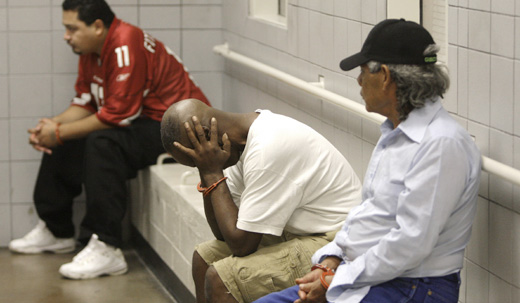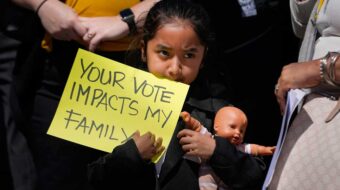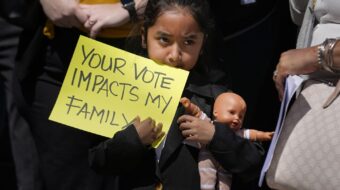
The failure by the U.S. Congress to pass either comprehensive immigration reform or the more limited “Dream Act” in 2009 or 2010 has created a very difficult situation for immigrant communities.
The Republicans in Congress have introduced draconian anti-immigrant legislation (H.R. 140). And some local jurisdictions are lining up to participate in government programs that facilitate cooperation between state, county and local police on the one hand, and the federal Department of Homeland Security on the other. But a new study show why these “enforcement only” strategies are likely to cause large scale suffering and disruption rather than solve the undocumented immigration problem.
The study http://www.migrationpolicy.org/pubs/287g-divergence.pdf is entitled “Delegation and Divergence: A study of 287 (g) State and Local Immigration Enforcement.” It was carried out for the Migration Policy Institute and co-authored by Randy Capps, Marc R. Rosenblum, Cristina Rodriguez and Muzaffar Christi.
The 287 (g) programs are cooperative arrangements between local, state or county governments and Immigration and Customs Enforcement (I.C.E.), the federal agency which enforces immigration law. In these programs, police officers are given training and support by I.C.E. and then have authority to ask people stopped in the course of investigations of major and minor infractions of the law if they are in the country illegally. People who give unsatisfactory answers can be handed over to I.C.E. for immigration processing.
There are several different models of 287 (g) programs. Some programs involve wide sweeps in the community in which people not accused of other crimes are likely to be caught up.
The focus of the programs is supposedly on people who are considered criminal suspects (including people with multiple infractions of immigration law such as failing to show up for a deportation hearing or returning to the country after being deported). But the federal government has made clear that even ordinary non-criminal undocumented immigrants encountered by 287 (g) authorized police agencies will be handed over to I.C.E.
As a result of this, there have been complaints about racial profiling in instances where police go after Latinos in the hope that they will turn out to be undocumented, and therefore can be processed under 287 (g). Some jurisdictions appear to have set up quotas for the number of people processed through the program, which puts pressure on individual officers to be more aggressive in stopping and questioning people.
The study focuses on 7 jurisdictions: The Frederick County, Md. Sheriff’s office; The Prince William County Police Department and Prince William-Manassas Adult Detention Center in Virginia; Cobb County, Ga. Sheriff’s Office; Gwinnet County, Ga. Sheriff’s Office; the Las Vegas, Nev. Metropolitan Police; the Los Angeles County, Calif. Sheriff’s Office and the Colorado Department of Public Safety.
The study findings are very disturbing. Though the 287 (g) program is sold to the public as targeted against dangerous criminals, in fact half the people processed through the program during the study period were stopped for minor offenses, including traffic infractions.
In the Southeastern jurisdictions analyzed in the study there seems to be a pattern of targeting the Latino community. Worse “State and local officials operate 287 (g) programs according to priorities shaped largely by political pressures”.
In Frederick and Prince William Counties, right wing Republican politicians have made “illegal immigration” their political hobbyhorse in recent elections. This has led to sharp conflicts between local authorities and the Latino communities.
In places where 287 (g) programs are utilized as political weapons by the local politicians, Latino people have been fleeing the area in droves. Frederick County, Md. lost 61 percent of its noncitizen Latino population since it went into 287 (g) in 2008, and Prince William County, Va. saw a 23 percent drop. Those who are leaving are not all undocumented immigrants: the fear of being harassed by police cuts across immigration status boundaries. And it is improbable that all are leaving the U.S. for their countries of origin.
A new study by the Pew Hispanic Center shows that the number of undocumented immigrants in the United States has risen again to 11.2 million, after declining after the 2008 financial and economic crisis. While the U.S. economy is in bad shape, most of the countries from which immigrants come are in even worse shape.
Immigrants’ rights advocates are not optimistic that progressive immigration reform legislation can be passed in the next two years, given the Republican Party’s control of the House of Representatives and its anti-immigrant bent. But the Migration Policy Institute’s study and many other kinds of evidence show that the issue of immigration reform is not going away and can not be solved by repressive measures against immigrants.
Photo: Suspects wait to have their immigration status checked by a fingerprint scanner at a 287(g) processing station, July 2010, Phoenix. (Ross D. Franklin/AP)












Comments